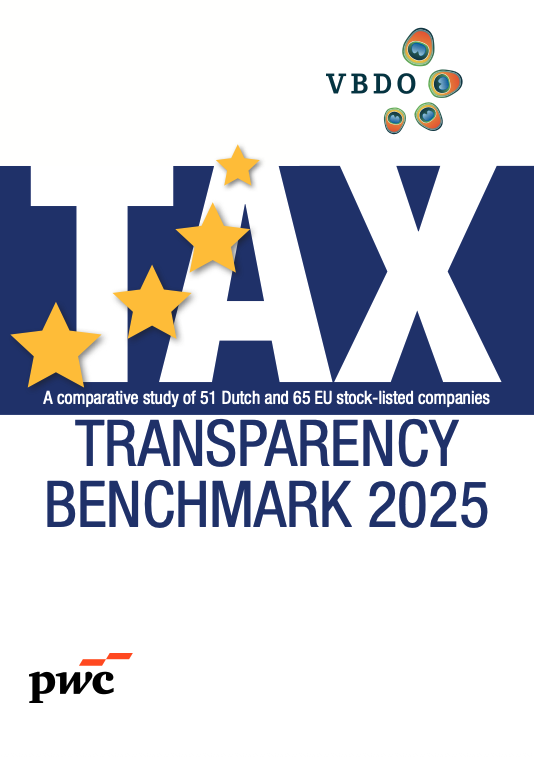Philips, Enel and Repsol lead on tax transparency, while 1 in 4 companies falls below the minimum threshold
The eleventh and final edition of the Tax Transparency Benchmark, published by the Dutch Association of Investors for Sustainable Development (VBDO), marks a pivotal moment. For the first time since its launch in 2015, the benchmark shows a decline in the average tax transparency score — dropping from 49% in 2024 to 44% in 2025. At the same time, the report highlights that structural improvements achieved over the past decade have taken root. Good tax governance is now firmly embedded in the ESG policies of many leading companies.
While 89% of companies continue to publish a tax strategy (down from 93% last year), the gap between frontrunners and underperformers is growing. No fewer than 33 of the 116 assessed companies — including nine Dutch firms — fall below the critical 25% threshold. By contrast, Philips (Netherlands), Enel (Italy) and Repsol (Spain) top the benchmark with scores of 98%, demonstrating what good tax governance looks like in practice.
“These three companies show that tax transparency is more than a box-ticking exercise — it’s a core element of sustainable business,” said Angélique Laskewitz, Executive Director of VBDO. “Philips effectively integrates tax and ESG, Enel reports transparently on fiscal incentives in the energy sector, and Repsol offers in-depth insights into tax risk and disputes. Their high performance is the result of years of continuous improvement and consistent policy.”
Investors must take responsibility
The benchmark confirms that tax transparency is a key component of the ‘G’ in ESG. Shareholders, in particular, have a critical role to play in driving change — with engagement as a proven and effective tool to improve tax transparency. But they are not alone. Advisors, accountants, NGOs, policymakers and broader civil society all contribute to keeping the issue on the agenda and raising the bar for corporate tax conduct.
The benchmark shows that visible engagement and constructive dialogue lead to real impact. Whether through feedback on reports, public statements on tax ethics or engagement at AGMs, every action contributes to growing awareness that transparent tax practices are essential to good governance.
Keetie Jakma, Tax Director at PwC: “Tax transparency is essential to building trust between companies, investors and society. Companies that actively engage with stakeholders early on around tax-related topics can make a real difference in meeting rising expectations. This requires a joint effort and close collaboration with advisors, policymakers and other stakeholders.”
Final edition, lasting legacy
This publication marks the end of the Tax Transparency Benchmark after eleven years. Since 2015, the number of companies publishing a tax strategy has risen from 45% to 89%. The quality of disclosures has also improved significantly, with stronger risk analysis, clearer governance structures and more attention to stakeholder engagement.
“We are concluding the benchmark with confidence that the movement we helped initiate can now stand on its own,” said Laskewitz. “With new regulation, evolving voluntary standards and ongoing pressure from civil society, companies now have the right incentives to continue the progress. The lessons of eleven years of benchmarking remain available for any company seeking to improve.”

